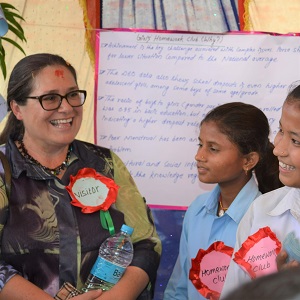
Pronouns
She/Her/Hers
Job Title
Chief of Education (retired)
Workplace
UNICEF Kenya (retired)
EDST Degree/s and graduation year/s
PhD, 2004; MEd, 1996
Concentration
Educational Studies—General
Residence
Marilyn taught school in Alberta after receiving her B.Ed at UofA in 1978. Joining Educational Studies at UBC in 1996, she received her MEd in Education Administration and Leadership, submitting a Graduating Paper titled “Community Mapping: Connecting Schools and Communities”. Her PhD in Educational Studies at UBC in 2004 included a dissertation titled “Relationships, Status, and Traditions: School and Community in a Fijian Village”. She supported staff development with teachers at the Monument Valley High School on the Navajo Reservation in Utah, the Aga Khan School in Tajikistan, in schools in Qatar and Abu Dhabi before joining UNICEF in 2010. As Chief of Education in Uzbekistan, she worked with the Government on improving Child Friendly Schools, Early Childhood Education, reducing institutionalization, and eliminating child labour. In 2015 Marilyn was in Kathmandu when a large earthquake destroyed 8000 schools in Nepal. The next 4 years were spent working with the Ministry of Education and NGOs to rebuild the education system to ensure that all children were able to attend school, as well as initiatives to address gender-based violence including child marriage. Moving to Nairobi, Kenya in 2019, Marilyn led the UNICEF education section to support refugee education, Early Childhood Development, and digital learning, as well as supporting the government to respond to the Covid crisis. Marilyn is now retired with her husband on their farm in Alberta.
Marilyn’s Story
Tell us more about your (current or previous) position. Describe your role
I have recently retired as Chief of Education for UNICEF, Kenya. In this role, I supported the Ministry of Education to plan, budget, implement, monitor, and review their education policies. Key priorities for UNICEF were early childhood development, literacy and numeracy, refugee education, out-of-school children, increased access to internet and other learning resources, emergency preparedness and response, and inclusive education. I worked closely with other international agencies (UNHCR, World Bank), bilateral aid agencies (DFID) international NGOs (Save the Children)and local organizations (Kenya ECD Network).
What are some accomplishments or highlights that you are most proud of?
In Uzbekistan, I supported the government to develop their first education plan and budget which was approved by international partners. We supported the government to ban child labour in the cotton fields. While I was in Nepal, UNICEF coordinated the aid efforts after the 2015 earthquake to provide education and reconstruction for 8000 schools.
What is something that you needed to learn (beyond your degree) or unlearn to be able to work in your sector?
The theoretical international development readings while I was at EDST were helpful in order to remember the bigger development picture for work on policies. However, my background in accounting (spreadsheets, budgets) was particularly helpful in day-to-day work. As UNICEF is becoming more involved in curriculum development, I wished that I had more background in that area as well as policy development.
How did you envision your career journey when you started your EDST program? And how did your career journey actually take off?
When I originally thought about being an education in another country, I thought only about being a teacher. While most countries are able to provide their own classroom teachers, many education systems are looking for international expertise in policy development, budgeting, curriculum development, inclusive education, gender based violence, and other emerging areas.
What advice would you give to someone who seeks to work in your sector?
While much of the actual coursework in EDST was not directly related to my work with UNICEF, having a PhD in Education was a factor in my being hired as a Chief of Education. Keep at it until you get the piece of paper!!
Tell us about any international work experience you embarked on during or after your program.
International work is very rewarding, although sometimes I felt like I was an imposter, pretending that I had expertise to offer when most of my national co-workers were at least as educated as I am. However, they were always anxious to learn from my Canadian experience. It is important to remain humble and learn from local colleagues. Often national colleagues are limited by family and political pressures, so it is important for international staff to ask the hard questions, take the risks, and keep up the pressure so that all children receive a quality education.